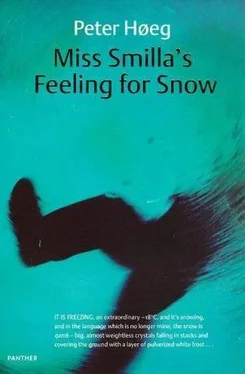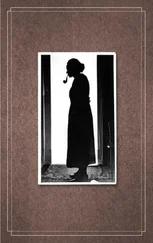Peter Høeg - Smilla's Sense of Snow aka Miss Smilla's Feeling for Snow
Здесь есть возможность читать онлайн «Peter Høeg - Smilla's Sense of Snow aka Miss Smilla's Feeling for Snow» весь текст электронной книги совершенно бесплатно (целиком полную версию без сокращений). В некоторых случаях можно слушать аудио, скачать через торрент в формате fb2 и присутствует краткое содержание. Жанр: Современная проза, на английском языке. Описание произведения, (предисловие) а так же отзывы посетителей доступны на портале библиотеки ЛибКат.
- Название:Smilla's Sense of Snow aka Miss Smilla's Feeling for Snow
- Автор:
- Жанр:
- Год:неизвестен
- ISBN:нет данных
- Рейтинг книги:3 / 5. Голосов: 1
-
Избранное:Добавить в избранное
- Отзывы:
-
Ваша оценка:
- 60
- 1
- 2
- 3
- 4
- 5
Smilla's Sense of Snow aka Miss Smilla's Feeling for Snow: краткое содержание, описание и аннотация
Предлагаем к чтению аннотацию, описание, краткое содержание или предисловие (зависит от того, что написал сам автор книги «Smilla's Sense of Snow aka Miss Smilla's Feeling for Snow»). Если вы не нашли необходимую информацию о книге — напишите в комментариях, мы постараемся отыскать её.
Smilla's Sense of Snow aka Miss Smilla's Feeling for Snow — читать онлайн бесплатно полную книгу (весь текст) целиком
Ниже представлен текст книги, разбитый по страницам. Система сохранения места последней прочитанной страницы, позволяет с удобством читать онлайн бесплатно книгу «Smilla's Sense of Snow aka Miss Smilla's Feeling for Snow», без необходимости каждый раз заново искать на чём Вы остановились. Поставьте закладку, и сможете в любой момент перейти на страницу, на которой закончили чтение.
Интервал:
Закладка:
I pull the screwdriver out of its cork and rip open the big black garbage bag.
It was the night before last that Jakkelsen showed me the cargo hold. Since yesterday I haven't gone anywhere without the screwdriver.
Yesterday around noon I left the laundry room to go back to my cabin and change my clothes.
My life as a whole might seem rather messy. But my clothes are always neat. I've brought along trouser hangers for my pants, inflatable hangers for my blouses, and I always fold my sweaters in a particular way. Your clothes will seem new and yet comfortable if they're properly ironed, folded, hung up, brushed, or stacked up in their place.
There's a T-shirt in my closet that's not folded the way it should be. I examine the pile. Someone has gone through it.
I sit down next to Jakkelsen in the mess. I haven't seen him since the night before. For a moment he stops eating, then he bends over his plate.
"Did you search my cabin?" I ask him quietly.
A touch of fear appears in his eyes, like a slight fever. He shakes his head. I ought to eat something, but I've lost my appetite. Before I report for work in the laundry room after lunch, I put two thin strips of tape on my door.
When I come back before dinner, they're broken. Since then I've carried the screwdriver with me everywhere. It might not be a rational reaction, but people use so many odd objects to buck up their courage. A Phillips screwdriver is no worse than so many other things.
A heap of men's clothing spills out of the bag onto the floor. Net undershirts, shirts, socks, jeans, underpants, and a pair of heavy pants made of cavalry twill.
What I have here is the first batch of laundry from the off-limits boat deck.
A small amount of women's clothing. A cardigan, stockings, a cotton skirt, towels labeled THE JUTLAND DAMASK MILLS and made of thick terry cloth, embroidered with the name Katja Claussen. She hasn't sent me anything else. I understand her quite well. Women don't like having others see or handle their laundry. If I wasn't the only one in charge of the laundry, I'd wash my own clothes in the sink and dry them over the back of a chair.
There's one other pile of men's clothing: T-shirts, shirts, sweatshirts, linen pants. There are three things worth noting. That everything is new, expensive, and size extra large.
"Jaspersen."
In every room on board the Kronos there are small black plastic telephones that can be activated from the bridge, allowing whoever's standing watch to interrupt and give orders whenever he likes. For me-at least at this moment-it's a manifestation of what has come out of the last forty years of technological development: brilliant, sophisticated, slightly despotic, and grotesquely superficial.
"Please serve coffee on the bridge."
I don't like being watched. I hate punch cards and flex time. I'm allergic to cross-referenced lists. I detest passport control and birth certificates. Obligatory school attendance; mandatory disclosure of information, legally required financial support, legal liability, oaths of confidentiality-the whole rotten monstrosity of government controls and demands that fall on your head when you come to Denmark. All the things that I normally sweep out of my mind but which may still confront me at any moment, perhaps manifested in a little black telephone.
I hate it even more because I know that it's also a kind of back-handed blessing: all the Western mania for control and archives and cataloging is meant to be helpful.
In the thirties, when they asked Ittussaarsuaq-who as a child had wandered with her tribe and kinfolk across Ellesmere Island to Greenland during the migration when Canadian Inuit had their first contact in seven hundred years with the Inuit of North Greenland-when they asked her, an eighty-five-year-old woman who had experienced the entire modern colonization process, moving from the Stone Age to the radio, how life was now, compared to the past, she said without hesitation, "Better-the Inuit very rarely die of hunger nowadays."
Emotions must flow purely if they're not to become confused. The problem with trying to hate the colonization of Greenland with a pure hatred is that, no matter what you may detest about it, the colonization irrefutably improved the material needs of an existence that was one of the most difficult in the world.
The intercom has been turned off. I lean against the wall next to it.
"I was just standing here," I say, "waiting for a chance to do my utmost."
On my way up, I step out onto the deck. The Kronos is rolling on long transverse waves, old swells formed by some distant storm that has disappeared, leaving behind nothing but this moving, matte-gray carpet of energy bound in water.
But the wind is blowing from the bow, a cold wind. I breathe in the air, open my mouth, letting it find a resonance, a deep upright wave, like when you blow across the top of an empty bottle.
The tarp has been taken off the landing vessel. Verlaine is working with his back to me. He's fastening long teak slats onto the bottom with an electric screwdriver.
Lukas is alone on the bridge. With his hand on the tiller. The automatic pilot is off. Something tells me that he prefers to steer manually, even though it results in a less precise course.
He doesn't turn around when I come in. Until he speaks, there's nothing to show that he knows I'm here. "You're limping."
He has developed an ability to see everything without looking directly at anything in particular.
"It's my varicose veins."
"Do you know where we are, Jaspersen?"
I pour him a cup of coffee. Urs knows exactly how he likes it. Thick and black and poisonous, like a thimble of boiling tar.
"I can smell Greenland. Today, out on the deck," I say. His back emanates suspicion. I try to explain. "It's the wind. It smells of earth. At the same time, it's cold and dry. There's ice in it. It's the wind from the ice cap that blows along the coast and reaches us out here."
I put the cup down in front of him. "I can't smell anything," he says.
"It's a scientific fact that chain smokers burn out their sense of smell. Strong coffee doesn't help, either."
"But you're right. Tonight, around 2:00 a.m., we'll pass Cape Farewell."
He wants something from me. He hasn't spoken to me since the day I came on board.
"It's customary that when you pass the cape, you make a report to Greenland Ice Center," he says.
I've spent three hundred flying hours in the Ice Center's Havilland Twin Otter, and three months in the barracks at Narsarsuaq drawing ice maps on the basis of aerial photos, which were then faxed to the Meteorological Institute, which in turn forwarded them to the shipping industry via Skamlebxk Radio. But I don't tell Lukas any of this.
"It's voluntary," he says. "But everyone takes advantage of it. They sign in and then report back every twenty-four hours."
He downs the coffee like swallowing an aspirin. "Unless you're on a mission that's not legal. And you want to hide your movements. If you don't report to the Ice Center, no word is sent to the Danish inspection vessels, either. Or to the police."
Everybody seems to be talking to me about the police. Verlaine, Maria, Jakkelsen. And now Lukas.
"We've made an agreement with the shipowner that the telephone on board would not be used during the trip. I'm willing to make one exception."
At first the offer takes me by surprise. I didn't think I'd given the impression that I needed to gab on the phone, whinning with my relatives via Lyngby Radio.
Then it dawns on me. Too late, of course, but all the more obvious. Lukas thinks I'm from the police. Verlaine thinks so, too. And Jakkelsen. They think I'm here undercover. That's the only explanation. That's why Lukas took me aboard.
I glance over at him. There's nothing evident, but it must be there: fear. It must have been there at our first meeting, in his face, turned away but reflected in the windowpanes of the casino. He must have made quite a few questionable voyages in his life. But there's something special about this one. This one scares him. So much that he took me on board, believing that I was on the trail of something. And that his reluctant cooperation would give him some sort of alibi if the hand of the law should fall on him and the Kronos and her passengers.
Читать дальшеИнтервал:
Закладка:
Похожие книги на «Smilla's Sense of Snow aka Miss Smilla's Feeling for Snow»
Представляем Вашему вниманию похожие книги на «Smilla's Sense of Snow aka Miss Smilla's Feeling for Snow» списком для выбора. Мы отобрали схожую по названию и смыслу литературу в надежде предоставить читателям больше вариантов отыскать новые, интересные, ещё непрочитанные произведения.
Обсуждение, отзывы о книге «Smilla's Sense of Snow aka Miss Smilla's Feeling for Snow» и просто собственные мнения читателей. Оставьте ваши комментарии, напишите, что Вы думаете о произведении, его смысле или главных героях. Укажите что конкретно понравилось, а что нет, и почему Вы так считаете.




![Рута Шепетис - Ashes in the Snow [aka Between Shades of Gray]](/books/414915/ruta-shepetis-ashes-in-the-snow-aka-between-shades-thumb.webp)







